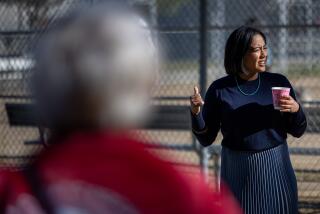Still Loyal After All These Years : Barring new riots and despite the poor economy, Jews and Westsiders are staying with Riordan.
Mayor Richard Riordan’s popularity has slipped a dramatic 13 points over the past year, according to a Times poll. Throughout the city, blacks, whites, Latinos and even residents of the San Fernando Valley, which heavily supported Riordan two years ago, all say that the city is still in bad shape and that Riordan has not delivered on his 1993 pledges to cut crime and improve the economy. The mayor’s popularity has dropped so low--now down to 46%--that he’s taken to being a jokemeister on morning talk radio.
But two groups have consistently stayed by his side: whites on the Westside and Jews. What explains this continuing appeal? Are Westsiders and Jews so out of sync they can’t see what everyone else is staring at?
Of course not. It’s just that these Riordan loyalists didn’t expect too much. This is a group with a long memory. Remember that Westsiders and Jews stayed with former Mayor Tom Bradley over five terms, putting him over the top even when much of the rest of the city deserted him. So loyalty counts for a lot in this group. If you ask them whether things are better, many of them will say, well, at least they aren’t worse.
More to the point, Jews take a vote seriously. The 1993 mayoral election was dramatic and painful for liberals and Jews. During the mayoral primary, Assemblyman Richard Katz (D-Sylmar) and City Councilman Joel Wachs split this vote, killing the chance for electing a liberal Jewish mayor.
The general election, pitting Riordan against City Councilman Michael Woo, a liberal Democrat, marked the first time that many Jews considered voting for a Republican. No big deal for other voters perhaps, but voting Democratic is an article of faith for Jews here. Even though the mayoralty is a nonpartisan office, the appeals made by both candidates were along party lines. Woo’s campaign portrayed him as committed to ethnic diversity while painting the conservative Riordan as the white man’s mayor, as if Los Angeles would return to the days of Sam Yorty. Jews, who had played such a large role in Bradley’s second and successful go against Yorty, found Woo hard to resist. But they were upset about crime, and Riordan promised change.
I spoke to countless voters who worried what their parents and grandparents--former socialists and Adlai Stevenson partisans--would make of their sudden shift to the right. They voted with a guilty conscience, only because things in Los Angeles had declined too far. It was not an easy fit: Riordan is a devout Roman Catholic with strong ties to the cardinal; Jews wondered what a Riordan victory would mean for abortion clinics in the city. And he is a millionaire businessman who proclaimed himself “tough enough to turn L.A. around;” Jews wondered what it would mean for the poor.
That things have not gotten dramatically better would not be reason enough for the citizens of the 5th and 11th districts to step away from their candidate now. Their only agenda item, stemming from the 1992 riots, was that he should not promote ethnic warfare. Whatever it meant to the rest of the city, the riots evoked fears for personal safety on the Westside that have not gone away. True, Riordan has not been able to make good on many of his promises, from more cops in the streets to the privatizing of trash collection and the airport. And after the riots, many Westsiders stopped going Downtown. But the mayor himself is not abrasive and his commissions are ethnically diverse, shielding ethnic heat.
This raises a question: How far does loyalty go? When pollsters call, Westsiders and Jews still answer that they are for Riordan. But in the voting booth, where it counts, they have turned their back on him. Riordan put his political clout behind Barbara Yaroslavsky’s candidacy for the 5th District seat in April, endorsing her in a press conference and holding a fundraiser for her. Michael Feuer, a political unknown, beat her 2 to 1. So much for popularity.
More to Read
Get the L.A. Times Politics newsletter
Deeply reported insights into legislation, politics and policy from Sacramento, Washington and beyond. In your inbox three times per week.
You may occasionally receive promotional content from the Los Angeles Times.










